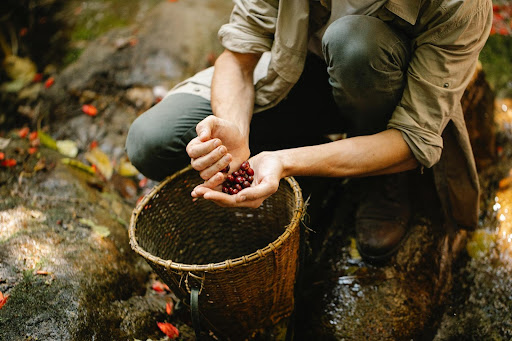Buying food can be cheap and easy, but if we try to be more conscious of what we’re putting into our bodies it can be more of a struggle. Many of us want to find food that’s not only healthy and inexpensive but also environmentally friendly and ethically sourced. Unfortunately, a lot of the options available to us cannot meet all three of these criteria, so we often must sacrifice in one area in order to purchase the food we need to live.
There are ways to amend this issue, however, and one of these methods is foraging. Foraging simply refers to the method of searching wild areas for naturally grown foods. It can be a great way to save money while ensuring your food is natural, healthy, and isn’t being obtained by any unethical means. If that sound appealing to you, foraging might be a great option to improve your eating and overall life.
Hidden Treasures
There are all sorts of foods that can be foraged instead of bought. The first step to getting started is finding out what these foods are and deciding what exactly you want to forage. You can try doing research about different categories of foods to narrow your search.
Mushrooms are a staple amongst foragers. Not only are they a great source of protein (and a good meat substitute for any vegetarians or vegans) but there are also so many species and varieties out there. From the common portabella mushroom to the Pholiota adiposa native to Asia, mushrooms of all kinds can be found practically everywhere. And due to the vast amount of mushroom species, you can find edible fungi any time of year regardless of the season.
You’re not limited to mushrooms when foraging though. There are also many fruits and veggies to be found in the wild as well. Whether on trees or bushes, climbing vines, or buried underground, much of the produce you’d find in a grocery store or farmer’s market can often be found through foraging.
It’s important to remember, no matter what kind of foods you’re searching for, that being able to properly identify specific foods is extremely important. While there are countless kinds of edible plants and fungi to forage, there are also some that are not edible and some that can be very dangerous. It’s crucial to do your research beforehand to know what you can and cannot eat. Many species even have toxic look-alikes that have evolved to appear similar to certain edible varieties, so always be aware of those as well.
Where The Magic Happens
To find all the delicious treasures nature has to offer you first need to know where to look. Look up what plant and fungi species are native to your area and where they occur. You can also ask any local foragers for tips or advice on where to find the best foods.
Don’t be afraid to explore and familiarize yourself with different areas around where you live. Travel to a few different places to see what kind of food is available. Always take note of the environment and observe the quantity, quality, and variety of forage there. Consider choosing a few areas to observe without actually gathering food at first, just so you’re able to see what’s available and decide where would be best for you to start.
It’s also important to forage in a few different spots not just for variety, but for sustainability as well. Like any method of sourcing food, there are ethical and unethical ways to forage. You don’t want to take every available edible in a certain area and leave none behind. Remember that you’re sharing these spaces with wild animals who don’t have other options to get their food as we do. Be mindful of what and how much you take. And try to give back as well! Save any seeds you may have leftover from your meals to plant again, provided it’s a native species for the area of course.
Reaping The Benefits
Foraging can be a wonderful way to save money, but there are many other benefits to it as well. It can improve your physical and mental health and also help the environment. There are many aspects of our lives that can greatly benefit from foraging.
Gathering wild food can be tremendously beneficial to your health. Natural produce often has more nutrients than processed foods we buy at the grocery store. Not to mention these organic foods have no added sugar, salt, or fat. Substituting junk food for naturally sweet berries or switching red meat out for protein-rich mushrooms will help keep you in top shape. In addition to the food, the act of foraging itself can help keep you healthy. Foraging often requires long walks to find and gather food, which can be great exercise and keep your body fit and moving. It has also been proven that spending time in nature can benefit your mental health. The tranquility of nature can help lower your stress levels and getting plenty of fresh air can help your respiratory system.
Finally, foraging for your food can be extremely beneficial to the environment. As long as you are foraging sustainably and responsibly you will be producing far less waste from traditional food packaging and fewer emissions from product transportation. Shifting to more sustainable methods of sourcing food can greatly improve the environment and help the planet as a whole.
Though it takes a bit of research and a lot of research and preparation, foraging can be a fantastic way to not only save money but also eat healthier and more ethically. As we continue to search for new ways to lower our expenses and stay fit, why not begin a fun hobby that can help you accomplish both in a sustainable and eco-friendly way?






